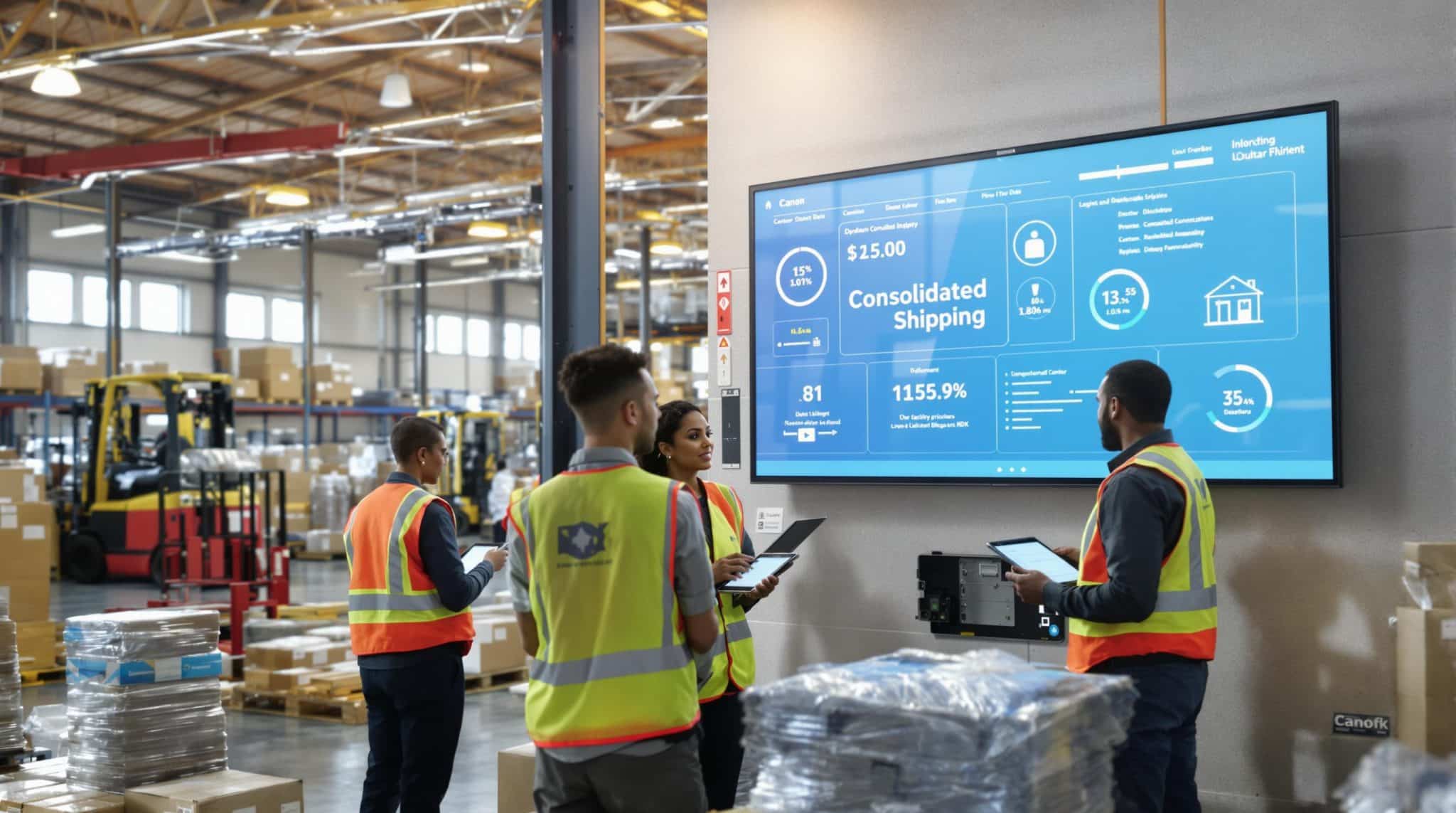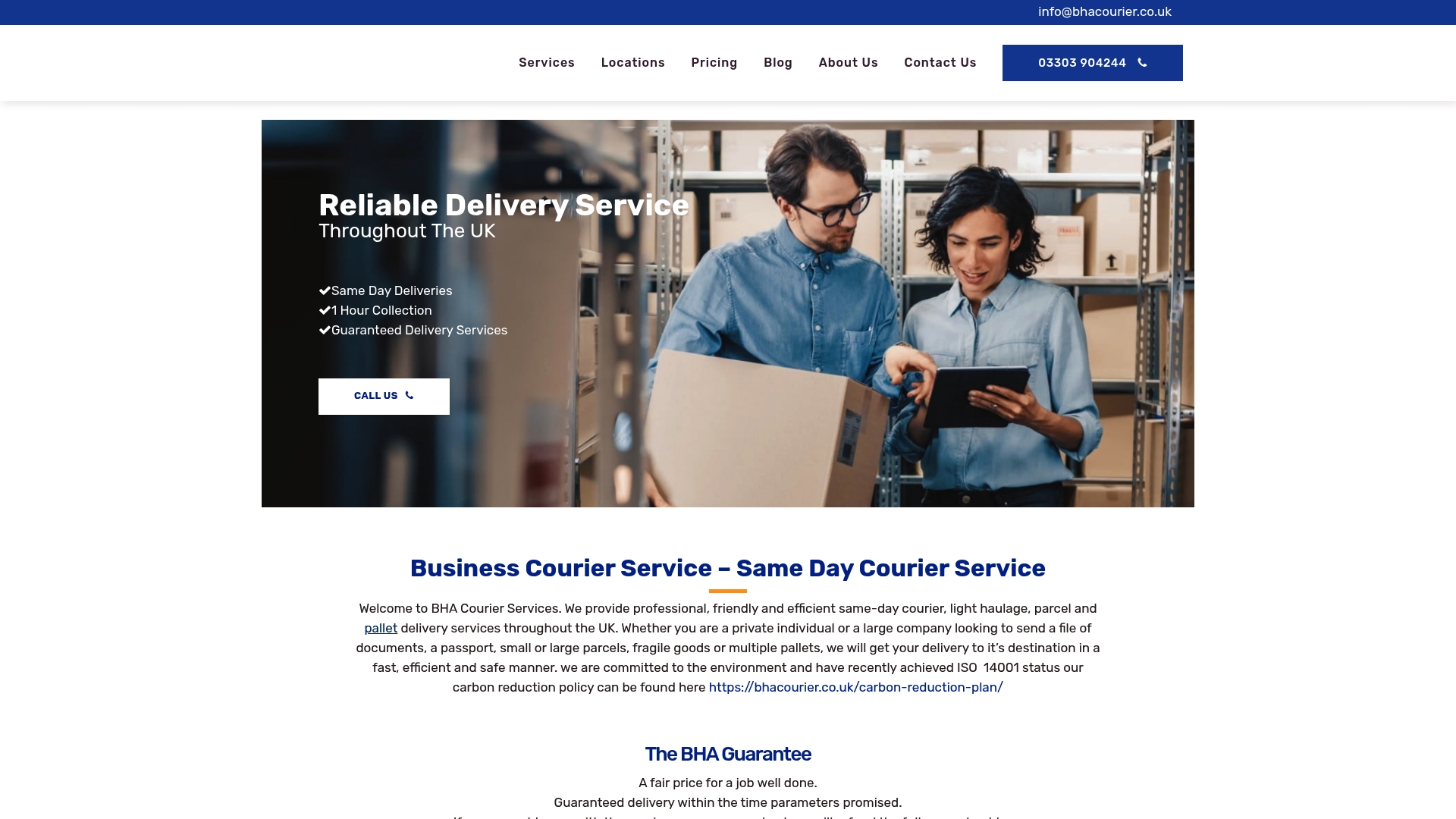
23 Jul Consolidated Shipments for UK Businesses: Benefits and 2025 Guide
UK businesses are searching for ways to cut shipping costs and manage growing supply chain pressures. It might seem like the only choices are to pay more or compromise on speed, but that thinking is out of date. The real surprise is that consolidated shipments can reduce transportation costs significantly and even lower CO2 emissions by up to 34 percent. By pooling deliveries, firms no longer have to choose between efficiency and sustainability. This approach is transforming how companies move goods in 2025.
Table of Contents
- What Are Consolidated Shipments In 2025?
- Key Benefits For Uk Businesses And Individuals
- How Consolidated Shipping Works: Step-By-Step
- Choosing The Right Partner For Consolidated Shipments
Quick Summary
| Takeaway | Explanation |
|---|---|
| Consolidated shipments reduce transportation costs significantly | By combining multiple smaller shipments, businesses can share shipping expenses, leading to substantial financial savings. |
| Environmental impact is greatly reduced with consolidation | Using consolidated shipments can lower CO2 emissions and fuel consumption, aligning with sustainability goals. |
| Understanding the consolidated shipping process is essential | Businesses must manage packaging, documentation, and final delivery to optimise logistics effectively. |
| Choosing the right shipping partner is crucial | A strategic logistics partner enhances operational efficiency through advanced capabilities and collaboration. |
| Robust tracking systems are necessary for compliance | Maintaining accurate records and real-time tracking is vital for navigating regulatory requirements effectively. |
What Are Consolidated Shipments in 2025?
Consolidated shipments represent an innovative logistics strategy that enables businesses to optimise their transportation costs and efficiency by combining multiple smaller shipments into a single, comprehensive delivery. As we approach 2025, this method is becoming increasingly critical for UK businesses seeking streamlined, cost-effective shipping solutions.
Understanding Consolidated Shipment Fundamentals
Consolidated shipments involve aggregating multiple smaller consignments from various shippers into one collective shipment. According to the European Commission’s 2025 Combined Nomenclature, this approach provides a standardised method for classifying and managing international trade goods.
Businesses can benefit from consolidated shipments through several key mechanisms:
- Space Optimisation: Maximising container utilisation by combining multiple smaller packages
- Cost Reduction: Sharing transportation expenses across multiple shipments
- Environmental Efficiency: Reducing overall carbon footprint by minimising unnecessary vehicle movements

Legal and Regulatory Considerations
The regulatory framework for consolidated shipments continues to evolve. As defined by 19 CFR 141.54, consolidated shipments involve combining multiple smaller shipments from different importers into a single container for transportation. This definition highlights the complex legal considerations businesses must navigate.
Key regulatory aspects businesses should consider include:
- Accurate documentation for each individual shipment
- Compliance with customs declarations
- Precise tracking and accountability for each consolidated package
By 2025, businesses will need robust digital tracking systems and comprehensive documentation processes to manage consolidated shipments effectively. The increasing complexity of global trade demands sophisticated logistics strategies that balance efficiency, cost-effectiveness, and regulatory compliance.
For UK businesses, mastering consolidated shipments means staying competitive in an increasingly interconnected global marketplace. As supply chains become more intricate and transportation costs fluctuate, the ability to consolidate shipments efficiently will be a critical differentiator for companies seeking to optimise their logistics operations.
The future of consolidated shipments is not just about moving goods from point A to point B but creating intelligent, responsive, and sustainable transportation networks that adapt to changing business needs. Businesses that invest in understanding and implementing these strategies will be best positioned to thrive in the evolving logistics landscape of 2025 and beyond.
Key Benefits for UK Businesses and Individuals
Consolidated shipments offer transformative advantages for UK businesses and individuals navigating the complex logistics landscape of 2025. By strategically combining multiple shipments, organisations can unlock significant operational and financial benefits that extend far beyond traditional shipping methods.
Economic and Operational Advantages
Economic efficiency stands at the core of consolidated shipments. Research from freight experts reveals that businesses can dramatically reduce transportation costs by sharing shipping expenses across multiple consignments. A detailed analysis shows that cooperative delivery approaches can generate substantial financial savings.
Businesses experience multiple economic benefits through consolidated shipments:
- Cost Reduction: Sharing transportation expenses minimises individual shipping expenditures
- Inventory Management: Enhanced control over stock levels and faster turnover
- Predictable Pricing: More consistent and transparent shipping expenditures
Environmental and Sustainability Impact
Beyond financial considerations, consolidated shipments deliver significant environmental benefits. A comprehensive study examining cooperative delivery approaches demonstrated remarkable ecological improvements, including:
- 28% reduction in fuel consumption
- 34% decrease in CO2 emissions
- Decreased traffic congestion through fewer vehicle movements
These environmental advantages align perfectly with growing corporate sustainability goals and consumer expectations for responsible business practices. Learn more about our sustainable courier solutions.
Strategic Advantages for Modern Businesses
Consolidated shipments represent more than a logistics strategy they are a comprehensive approach to supply chain management. Freight management experts highlight that this method provides enhanced inventory control, preventing overstocking and stockouts while ensuring businesses can meet customer demand efficiently.
For UK businesses operating in an increasingly competitive global marketplace, consolidated shipments offer a strategic advantage. They provide flexibility, cost-effectiveness, and a robust framework for managing complex shipping requirements. Small and medium enterprises particularly benefit from this approach, gaining access to shipping efficiencies typically reserved for large corporations.
Individuals and businesses alike will find consolidated shipments increasingly relevant in 2025. As global supply chains become more intricate and environmental regulations more stringent, the ability to ship goods efficiently and sustainably will be crucial. Organisations that embrace these innovative logistics strategies will position themselves at the forefront of operational excellence, demonstrating adaptability and forward thinking in an ever-evolving commercial landscape.
To help visualise the economic, environmental, and strategic benefits of consolidated shipments, the following table summarises key advantages for UK businesses and individuals:
| Area | Benefit | Details |
|---|---|---|
| Economic | Cost Reduction | Share shipping expenses and lower per-shipment costs |
| Economic | Inventory Management | Improved stock turnover and control |
| Economic | Predictable Pricing | More consistent and transparent shipping costs |
| Environmental | Fuel Consumption Reduced | Up to 28% reduction through fewer and fuller trips |
| Environmental | Lower CO2 Emissions | Up to 34% decrease in emissions with consolidated shipments |
| Environmental | Traffic Congestion Decreased | Fewer vehicle movements due to shipment pooling |
| Strategic | Enhanced Inventory Control | Prevents overstocking/stockouts, matches supply with demand |
| Strategic | Flexibility and Scalability | Accommodates growing business and shifting logistics needs |
How Consolidated Shipping Works: Step-by-Step
Consolidated shipping represents a sophisticated logistics strategy that transforms how businesses and individuals manage their transportation needs. Understanding the intricate process behind consolidated shipping can help organisations optimise their logistics and reduce overall shipping expenses.
To clarify the consolidated shipping journey, the following table outlines the key steps in the process and the main actions involved at each stage:
| Step | Main Actions | Purpose |
|---|---|---|
| Initial Collection & Preparation | Packaging, accurate documentation, labelling | Prepare shipments for safe transport |
| Consolidation | Grouping, arranging for space, real-time tracking | Maximise load efficiency, reduce costs |
| Transportation | Coordinating with carriers and logistics providers | Move consolidated shipment efficiently |
| Deconsolidation | Sorting and preparation for distribution | Ready parcels for onward delivery |
| Final Delivery | Local distribution, tracking, confirmation | Ensure parcels arrive to recipients |
Initial Collection and Preparation
According to logistics experts, the consolidated shipping process begins with meticulous cargo collection and preparation. Businesses and individual shippers must carefully package and document their shipments, ensuring each item is appropriately labeled and meets transportation requirements.
Key preparation steps include:
- Precise Packaging: Ensuring items are securely packed to prevent damage during transit
- Accurate Documentation: Preparing comprehensive shipping manifests and customs declarations
- Size and Weight Standardisation: Organizing packages to facilitate efficient consolidation

Consolidation and Transportation Process
Once individual shipments are prepared, shipping logistics resources highlight the critical consolidation stage. During this phase, multiple smaller shipments are strategically combined into a single, more efficient transportation unit.
The consolidation process involves several sophisticated steps:
- Grouping shipments with similar destinations
- Optimising cargo arrangement for maximum space utilisation
- Implementing real-time tracking technologies
- Coordinating with multiple carriers and logistics providers
Final Delivery and Distribution
Comprehensive shipping guides emphasise the importance of the final delivery stage. After transportation, consolidated shipments undergo deconsolidation, where individual packages are sorted and prepared for local distribution.
The final delivery process includes:
- Customs clearance and inspection
- Package sorting and local distribution
- Final mile delivery to intended recipients
- Tracking and confirmation of successful delivery
Modern consolidated shipping leverages advanced technologies to enhance efficiency. Artificial intelligence and machine learning algorithms now help optimise routing, predict potential delays, and provide unprecedented visibility throughout the shipping journey.
For UK businesses and individuals, understanding these intricate steps is crucial. Consolidated shipping offers more than just cost savings it provides a comprehensive, intelligent approach to managing logistics in an increasingly complex global marketplace. By embracing these advanced shipping strategies, organisations can achieve greater operational efficiency, reduce environmental impact, and maintain competitive advantage in 2025 and beyond.
Choosing the Right Partner for Consolidated Shipments
Selecting the appropriate logistics partner for consolidated shipments is a critical decision that can significantly impact a business’s operational efficiency, cost-effectiveness, and overall supply chain performance. The right partnership can transform shipping from a mere operational necessity into a strategic advantage.
Evaluating Partner Capabilities
Strategic logistics research highlights the crucial factors businesses must consider when selecting a consolidated shipment partner. The evaluation process goes beyond simple cost comparisons, requiring a comprehensive assessment of potential logistics providers.
Key criteria for partner selection include:
- Service Quality: Consistency and reliability of delivery performance
- Technological Capabilities: Advanced tracking and communication systems
- Network Coverage: Extensive geographical reach and distribution networks
- Flexibility: Ability to adapt to changing business requirements
Strategic Alignment and Compatibility
A comprehensive study on logistics alliances demonstrates the importance of strategic compatibility between businesses and their shipping partners. This goes beyond transactional relationships, focusing on long-term collaborative potential.
Businesses should assess potential partners through multiple lenses:
- Alignment of operational philosophies
- Shared commitment to sustainability
- Technological integration capabilities
- Financial stability and growth potential
Risk Management and Performance Metrics
Research into container shipping alliances emphasizes the critical nature of establishing clear performance metrics and risk management strategies. Our comprehensive shipping solutions provide businesses with the transparency and reliability needed in modern logistics.
Essential considerations for risk management include:
- Comprehensive insurance coverage
- Robust tracking and documentation processes
- Clear communication protocols
- Contingency planning for potential disruptions
In the evolving logistics landscape of 2025, the right shipping partner is more than a service provider they are a strategic ally. Businesses must look beyond immediate cost savings and evaluate partners based on their ability to provide comprehensive, adaptable, and technologically advanced shipping solutions.
The ideal consolidated shipment partner will offer a perfect blend of technological innovation, extensive network coverage, and a deep understanding of evolving business needs. They should provide not just a shipping service, but a holistic logistics solution that supports your business’s growth, efficiency, and sustainability goals.
Ultimately, choosing the right partner for consolidated shipments is about creating a symbiotic relationship that drives operational excellence. By carefully evaluating potential partners across multiple dimensions, businesses can establish a logistics strategy that becomes a true competitive advantage in an increasingly complex global marketplace.
Frequently Asked Questions
What are consolidated shipments?
Consolidated shipments involve combining multiple smaller consignments from different shippers into a single, larger shipment to optimise transportation costs and efficiency.
What are the benefits of using consolidated shipments for UK businesses?
Using consolidated shipments can significantly reduce transportation costs, lower CO2 emissions, improve inventory management, and provide predictable pricing for shipping.
How does the consolidated shipping process work?
The process of consolidated shipping includes initial collection and preparation of individual shipments, the consolidation of these shipments into a single transport unit, transportation to the destination, and final delivery and distribution.
Why is choosing the right partner for consolidated shipments important?
Selecting the right logistics partner is crucial as it can enhance operational efficiency, provide advanced tracking capabilities, ensure compliance with regulations, and ultimately contribute to better supply chain performance.
Take the Next Step in Efficient and Sustainable Shipping
Is your business weighed down by rising logistics costs and increasingly strict environmental expectations? The article above discussed the power of consolidated shipments to streamline UK supply chains and cut emissions, but many companies still face hurdles in finding reliable partners who guarantee speed, security, and transparency throughout the shipping process. If you want confidence that each delivery meets tight timelines and regulatory requirements, you need a service built for modern business demands.

BHA Courier delivers fast, secure solutions that match the latest requirements for consolidated shipments. From same-day and guaranteed next-day courier services to specialist handling of fragile or time-sensitive goods, our nationwide network supports cost-effective, environmentally conscious transport. Our ISO 14001 certification and real-time tracking reflect a genuine commitment to both your sustainability and operational goals. Take control today with a trusted partner. Discover more, get a quote, or book now directly on BHA Courier. When every shipment counts, your next move should be with a courier that moves your business forward.


